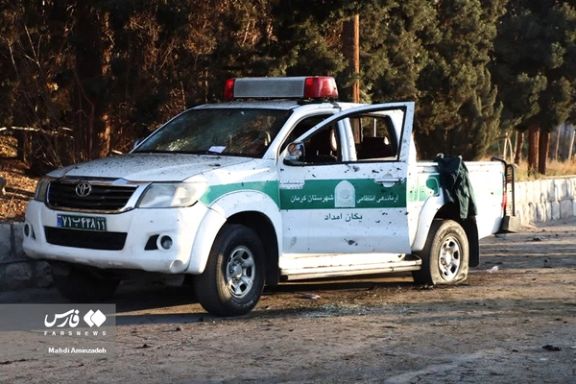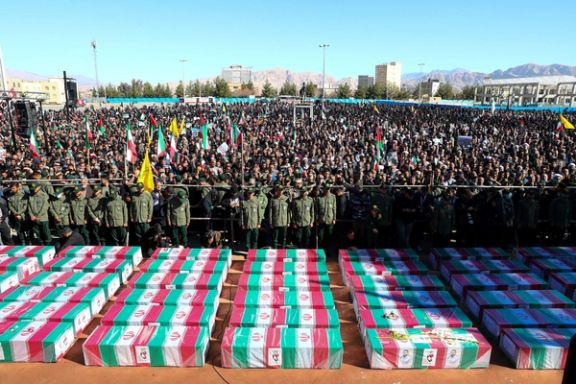Iran's Security Apparatus Under Fire Over Kerman Twin Blasts

Amid growing public pressure for accountability over the deadly bomb attack in Iran on January 3, authorities are scrambling to defend the security apparatus.

Amid growing public pressure for accountability over the deadly bomb attack in Iran on January 3, authorities are scrambling to defend the security apparatus.
In the wake of the deadly explosions that targeted a memorial ceremony for slain Revolutionary Guard commander Qasem Soleimani at his grave, the Islamic Republic authorities are in hot water over the intelligence lapses and security failures that led to the incident, claimed by ISIS.
Trying to mend their blemished reputation, senior officials claim that they have arrested tens of people and foiled several other bombing attempts planned for the day, which saw the biggest terror attack since the Islamic Republic was founded in 1979. The blasts were described as "two suicide explosions" that killed about 90 people and injured over 200 others.
Head of the Armed Forces' Judicial Organization in Kerman, Ali Tavakkoli, claimed that over 64 bombs were discovered nationwide, intended to detonate during the fourth anniversary of the death of Soleimani, the former commander of IRGC’s extraterritorial force who is seen as the architect of Iran’s network of proxy militias and was killed by a US drone in 2020.
Claiming that they had intel on enemy threats, Tavakkoli said that “16 explosive devices” designed to target the gathering at the cemetery were neutralized in Kerman prior to the January 3 attack.
Echoing the clams, Mehdi Bakhshi, the prosecutor of Kerman, said that each of the 16 bombs discovered in Kerman province had a greater explosive power than the vests worn by suicide bombers in the twin blasts.

Bakhshi also claimed that, in recent months, 32 people, including 23 ISIS members related to the explosions, have been detained. He did not elaborate on how the individuals already in custody were involved in the attack. Additionally, he stated that two other suicide bombers who had planned to attack the funeral procession of the blast victims were also arrested.
Meanwhile, the public relations office of Sarallah of Kerman, IRGC’s regional headquarters in charge of the security of the city, rejected reports of “neutralizing any bombs in recent days” in a statement on Sunday, labeling the reports as “rumors and fabrications.” It did not specify if the report about 16 discovered bombs mentioned by authorities is true or false.
Bakhshi said that based on a series of on-site inspections and meetings with various security entities, including the Intelligence, IRGC, law enforcement, and army, “there has been no negligence” on the part of those responsible for the security of the event. “Our inherent duty is to address any deficiencies or negligence... We have no bias, and our approach is impartial, but as of now, we have not encountered any such findings."
However, critical voices are growing in Iran calling for punishment of senior authorities responsible for the security of the event. Jomhouri-e Eslami, a conservative Iranian newspaper, published an editorial Sunday saying that “security and intelligence officials must be accountable for every incident that occurs.”
“Certainly, it is not the case that a crime as significant as the terrorist incident in Kerman occurs, and no one is found to be negligent or at fault,” said the daily, noting that one of the country's problems is that no one is held responsible for such incidents. “As soon as a major incident happens, officials start chanting slogans and delivering speeches aimed at directing all attention towards the enemy... Security is not ensured through speeches."
Former lawmaker Mohammad-Javad Haghshenas said Sunday that "There is no doubt about the negligence on the part of the Interior Ministry and security authorities in Kerman province,” calling on both the administration and the parliament to take punitive actions including impeachment.
The failure that led to the Kerman attack has laid bare serious gaps in the country’s intelligence apparatus, which has intensified measures to silence any critical voice that defies the regime’s narrative of the incident.
In addition to arresting dozens of people who discussed the incident online in recent days, Iran has also launched a targeted campaign on X (formerly Twitter), with cyber agents revealing the identities of anonymous dissident users and threatening them against sharing their thoughts about Soleimani’s bloody legacy for Iranians, who question how many more casualties the commander would cause even after his death. During Soleimani’s burial procession in 2020, about 60 people were crushed to death in a stampede. A few days later, the IRGC shot down Ukraine's flight PS752, killing 176 people onboard, as it was expecting retaliation for firing more than a dozen missiles at Iraqi bases hosting US troops to avenge Soleimani’s killing.
Iran’s cyber police report that more than 500 people have been summoned to court over their online posts about the incident. Generally, questioning the efficacy of the security and intelligence services that had not seen the attack coming is not allowed and suggesting that the authorities were aware of the threats beforehand is also prohibited.
Generally, no one is allowed to question the efficacy of the security and intelligence services, nor can one suggest the authorities were aware of the threats beforehand.
The absence of high-ranking officials and the Soleimani family at the ceremony remains the elephant in the room and nobody dare describe the attendants of the memorial as supporters of “a terrorist” -- as labeled by former US president Donald Trump who ordered his killing.
But questions now surround the atrocity which has left Iran with serious demands for answers.